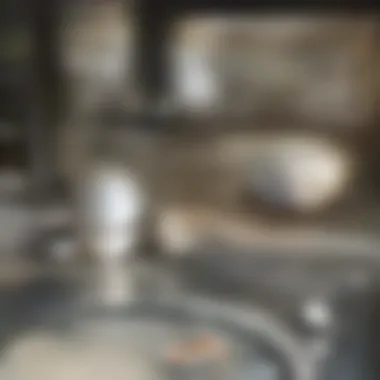Optimal Cleaning Agents for Glass Top Stoves


Intro
Maintaining the pristine look of glass top stoves is essential for many homeowners. These surfaces not only enhance the aesthetic of a kitchen but also reflect care and attention to detail in cooking spaces. As a result, understanding the right cleaning agents for glass top stoves is a priority for those who value cleanliness and functionality in their homes. It is crucial to choose effective and safe products to preserve the integrity of these glass surfaces, ensuring they look new for years.
In this article, we will explore various cleaning options for glass top stoves. The discussion will cover both commercial products and homemade alternatives, weighing their effectiveness, safety, and usability. By examining their compositions and cleaning efficiencies, readers will gain insight into the best practices for upkeep.
This knowledge will assist homeowners in making informed choices about cleaning products that suit their preferences and lifestyles. The aim is not just to offer practical advice, but also to foster a deeper understanding of how to maintain a flawless cooking environment.
Foreword to Glass Top Stoves
Glass top stoves offer a modern and sleek alternative to traditional cooking surfaces. Their aesthetic appeal is significant, making them a popular choice in kitchen design. However, with beauty comes the responsibility of proper maintenance. Understanding glass top stove technology is crucial for homeowners and cooking enthusiasts alike. Without a thorough knowledge of how these surfaces function, it is easy to make cleaning mistakes that can lead to lasting damage.
Understanding Glass Top Stove Technology
Glass top stoves are generally made from tempered glass, providing both durability and an attractive look. They utilize radiant heat, which is produced by electric coils or induction elements beneath the glass surface. This design has its advantages, such as quick heating and easy cleanup. Nonetheless, the glass surface is sensitive to both heat and cleaning agents, requiring cautious handling. Utilizing incompatible cleaning products can lead to scratches or discoloration.
It is important to familiarize oneself with the specific model of your stove. Different manufacturers may recommend various cleaning methods. It is advisable to read the user manual to understand the recommended solutions and avoid damaging the surface. An informed approach helps prolong the life of your appliance and maintain its pristine appearance.
Importance of Proper Cleaning
Proper cleaning of glass top stoves is not just about aesthetics; it directly influences the performance and lifespan of the appliance. Stubborn stains, grease, and accumulated debris can affect cooking efficiency by hindering heat distribution. Moreover, if left unattended, these residues may become more challenging to remove, necessitating harsher cleaning agents that can damage the surface.
Maintaining a regular cleaning routine can prevent messy build-up. This includes daily surface wipe-downs and immediate attention to spills. Such practices contribute significantly to the overall upkeep of your glass top stove and enhance its longevity. The right cleaning agents, whether commercial or homemade, play a vital role in preserving the integrity of the cooking surface.
"Choosing the right cleaning agents for glass top stoves not only maintains their appearance but also ensures their efficiency and durability."
Understanding these elements leads to a safer and more effective cleaning experience. This article will explore the various options available, helping you make informed decisions on the best cleaning products for your glass top stove.
Types of Cleaners for Glass Top Stoves
The process of maintaining glass top stoves involves choosing effective cleaning agents that do not compromise the surface or functionality. Understanding the various cleaning options available is essential for homeowners who seek both ease of use and safety. This section will outline the two primary categories of cleaners: commercial cleaners and homemade solutions. Each type has unique characteristics, benefits, and considerations, which are vital in achieving optimal cleaning without causing damage to the stove.
Commercial Cleaners
Commercial cleaners are designed specifically for glass top stoves. They are widely available in stores and offer the convenience of ready-to-use solutions. Their formulations typically include ingredients that effectively break down grease, grime, and burnt food residues. The following subsections elaborate on different types of commercial cleaners that may be used.
Liquid Cleaners
Liquid cleaners are a popular choice among homeowners for their versatility and effectiveness. They come in bottles with easy pour nozzles, allowing for controlled application on the stove surface. One benefit of liquid cleaners is their ability to penetrate deeper into tough stains. They are often equipped with surfactants that lift dirt and grime off the surface without the need for excessive scrubbing.
A unique feature of liquid cleaners is their varied formulations, where some might include gentle abrasives or conditioning agents. These properties can enhance cleaning performance while being safe for glass. However, it's essential to follow usage instructions carefully. Some liquid cleaners can leave a residue if not wiped properly, potentially necessitating additional cleaning.
Spray Cleaners
Spray cleaners provide another effective method for cleaning glass top stoves. Their design encourages quick application over large areas. This characteristic makes them favorable for busy kitchens, allowing for rapid cleaning sessions. Most spray cleaners come with a nozzle that creates a fine mist, promoting even coverage.
An important aspect of spray cleaners is that they usually contain ingredients that cut through grease and burnt stains. However, some types may also release strong odors during application. It’s advisable for users to enhance kitchen ventilation while cleaning. Additionally, ensuring that the surface is cool before application is critical to avoid any chemical reactions that might lead to damage.
Ready-to-Use Wipes


Ready-to-use wipes offer a convenient, portable cleaning option for glass top stoves. The pre-moistened cloths are handy for quick clean-ups after cooking. There are easy to pull from their containers, making them accessible. The wipes are often infused with cleaning solutions that work to dissolve stains and protect surfaces.
The significant benefit of wipes is their practicality, as they require no additional cleaning agents or tools. However, a downside to this option is that the texture of some wipes can be less effective against heavy stains, thus necessitating multiple applications. Knowing when to switch to alternative cleaning methods is important to maintain the stove's surface.
Homemade Solutions
Homemade cleaning solutions have gained popularity for their cost-effectiveness and accessibility. Many of these options leverage common household ingredients, making them an attractive alternative for those wary of commercial chemicals. Below are some notable homemade cleaners suitable for glass top stoves.
Baking Soda Paste
Baking soda paste is well-known for its gentle abrasive properties. Many homeowners find it useful for removing tough stains without scratching glass surfaces. To use it, simply mix baking soda with a small amount of water until it forms a paste. This mixture can be spread on stubborn stains and left to sit for a few minutes before gentle scrubbing.
The key characteristic of this paste is its safety due to non-toxic ingredients. This makes it appealing for users who prefer natural cleaning methods. However, users should keep in mind that while baking soda works well on mild to moderate stains, it may not be as effective against charred or heavily burnt residues.
Vinegar and Water Solution
A vinegar and water solution is another popular homemade cleaner praised for its degreasing capability. The acidity of vinegar breaks down tough grease and burnt-on food particles, making it easier to wipe away stains. For this solution, mixing equal parts of vinegar and water in a spray bottle provides a ready-to-use cleaner.
This blend is advantageous as it’s readily available and inexpensive. However, the strong smell of vinegar may not be to everyone's liking. It's crucial to rinse the surface with clean water after application to remove any leftover vinegar scent.
Dish Soap and Water Mixture
A dish soap and water mixture serves as a gentle yet effective cleaner for glass top stoves. By mixing a few drops of dish soap with warm water, users can create a solution suitable for grime and surface cleaning. This option is often preferred for daily maintenance due to its simplicity.
The major advantage of this method is that it is safe and effective for routine cleaning. However, it may not be sufficient for removing stubborn stains or grease built-up over time. Regular use alongside other cleaning options can help keep the stove in good condition.
Criteria for Evaluating Cleaning Products
When choosing a cleaning agent for glass top stoves, it is crucial to consider specific criteria. These factors ensure that the chosen product effectively cleans without causing damage to the stove's surface. Evaluating cleaning products through this lens provides homeowners with a systematic approach to maintaining their kitchen surfaces.
Effectiveness in Removing Stains
Cleaning agents vary in their ability to tackle stains commonly found on glass top stoves, such as burnt food or grease. The effectiveness of a product is primarily determined by its composition. For instance, commercial cleaners may contain abrasive materials or strong chemicals designed to break down tough grime efficiently. Homemade solutions, while often gentler, may require more effort and time to yield comparable results. Assessing the cleaning power of a product involves reviewing its ingredient list and understanding how these components interact with the residues on glass surfaces.
Additionally, user reviews and product ratings can provide insights into real-world effectiveness. Understanding the types of stains that each cleaner can manage helps users select the most suitable option based on common cooking scenarios and personal preferences.
Safety for Glass Surfaces
When cleaning any delicate surface, safety should never be underestimated. Some cleaning agents may be too harsh for glass top stoves, leading to micro-scratches or a cloudy appearance over time. It is essential to select products specifically labeled as safe for glass surfaces. This information can often be found on the packaging.
In the case of homemade cleaners, users should ensure that the chosen ingredients do not contain vinegar concentrations that may harm the integrity of the glass. Many people opt for soaps that are pH-neutral, which can clean effectively without damaging surfaces. Safety is about striking a balance between cleaning power and the well-being of the stove itself.
Ease of Application
A cleaning product must not only work well but also be easy to use. The complexity of the application process can impact the likelihood of regular maintenance by users. Some commercial cleaners offer ready-to-use options, like sprays or wipes, that simplify the cleaning process. On the other hand, homemade solutions may require preparation and additional steps.
When evaluating ease of application, consider factors such as drying time, the necessity for scrubbing, and how quickly the cleaner works. Products that require minimal effort are more likely to be used consistently, ensuring the longevity and pristine condition of the glass surface.
Top Commercial Cleaners Reviewed


When it comes to maintaining the pristine condition of glass top stoves, understanding the available commercial cleaning agents is crucial. Commercial cleaners often offer specialized formulations that target the unique challenges posed by glass surfaces. Their effectiveness is a significant factor that can positively impact daily cooking experiences. By evaluating these products, homeowners can identify which cleaners meet their needs, ensuring safe and effective use.
Highlights of the Leading Brands
Several brands have distinguished themselves in the field of commercial glass top stove cleaners. The emphasis is on both cleaning efficiency and user safety.
- Weiman specializes in products tailored specifically for glass and ceramic surfaces. Their cleaner is known for its effectiveness in removing tough stains and grease, while being gentle on the glass.
- Bar Keepers Friend also pleases many users with its multi-surface cleaner. It’s often praised for its ability to tackle burnt-on food without scratching the surface.
- Cerama Bryte brings a solid reputation with its streak-free formula. Users appreciate its ease of use and quick results functional for everyday cleaning.
These products are designed to maintain the shine and clarity of glass top stoves, making them a popular choice among users.
Comparative Effectiveness
When assessing the effectiveness of commercial cleaners for glass top stoves, a few elements should be considered:
- Cleaning Power: The ability of a cleaner to remove tough stains and burnt residues shows its initial effectiveness. Many leading brands utilize powerful surfactants that break down grease and grime effectively.
- Safety: The safer the product is for the stove surface, the more preferred it becomes. Users often seek out cleaners that promise not to scratch or damage the glass surface.
- Ease of Use: This includes how convenient a product is to apply. Spray bottles and ready-to-use wipes lead in user popularity because they simplify the cleaning process.
In summary, the leading commercial cleaners offer a balance of effectiveness, safety, and ease of application. By reviewing these factors, users can select the best cleaning agents tailored to maintaining their glass top stoves effectively.
Homemade Cleaner Effectiveness
Homemade cleaners have gained significant traction among homeowners seeking sustainable and cost-effective alternatives to commercial products. Understanding their effectiveness is crucial, especially for those who prioritize both cleanliness and safety in their kitchens. Using household items not only reduces the reliance on harsh chemicals but also supports a more eco-friendly lifestyle. However, the effectiveness of these solutions can vary, making it necessary to evaluate their composition and results.
Baking Soda Paste Results
Baking soda is a versatile ingredient often regarded for its cleaning properties. When mixed with water to form a paste, it becomes a powerful abrasive cleaner. This paste can effectively remove stubborn stains and burnt-on food debris from glass top stoves. The fine granules in the baking soda help gently scrub the surface without scratching it. This is particularly important as glass surfaces can be sensitive to harsh abrasives.
Moreover, baking soda has natural deodorizing properties, making it beneficial for eliminating unpleasant odors that can linger after cooking. Users typically report that applying the paste and allowing it to sit for a few minutes before scrubbing can enhance its stain-removal effectiveness. This method not only cleans but also reinforces the shine of the glass top, giving it a fresh and well-maintained appearance.
Evaluating Vinegar Applications
Vinegar is another common household item known for its cleaning abilities, particularly due to its acetic acid content. It can dissolve mineral deposits, grease, and grime effectively. When combined with water, it creates a solution that is often used for cleaning various kitchen surfaces, glass tops included. The natural acidity of vinegar helps break down tough residues without leaving toxic chemicals behind.
However, it is essential to note that vinegar should be used with caution on glass surfaces. While it works well for routine cleaning, prolonged contact might lead to potential etching. Therefore, it is advisable to use the vinegar solution sparingly and to rinse the surface thoroughly after application. This ensures that the glass will remain in optimal condition over time, without compromising its integrity.
Dish Soap Performance Analysis
Dish soap is a staple in many kitchens, valued for its grease-cutting capabilities. When mixed with water, it creates a solution that can effectively remove light food residues and stains from glass top stoves. The primary advantage of dish soap is its ease of use and availability. It is non-toxic and gentle, making it a safe choice for regular cleaning tasks.
For best results, it is recommended to use warm water and a few drops of dish soap. After applying the solution, a soft cloth or sponge should be used to wipe the surface. This method helps in lifting grime without scratching the glass. Additionally, dish soap is an excellent option for maintaining the stove’s cleanliness after daily cooking, preventing the buildup of baked-on debris.
"Homemade cleaning solutions often prove to be effective and safer alternatives to commercial products."
By comparing these homemade cleaning agents, it becomes evident that each has unique strengths. Baking soda is excellent for tough stains, vinegar is effective for regular maintenance, and dish soap is suitable for everyday cleaning. Homeowners can choose the best option depending on their specific needs, ensuring their glass top stoves remain clean and visually appealing.
Maintenance Tips for Glass Top Stoves
Maintaining glass top stoves is crucial for ensuring their longevity and performance. With proper care, you can keep the surface clean and free from scratches, which preserves both the aesthetic appeal and functionality. Regular maintenance can also reduce the need for intensive cleaning later, as it prevents build-up that can become harder to remove over time.
Being proactive with maintenance helps in identifying minor issues before they escalate into more significant problems. Furthermore, an adequately maintained stove not only looks better but also operates more efficiently, reflecting your attention to detail and care for your kitchen appliances.


Daily Cleaning Practices
Establishing daily cleaning practices can greatly enhance the appearance and longevity of your glass top stove. After each use, it is advisable to wipe down the surface with a soft cloth or sponge that does not scratch. Use a mild dish soap mixed with warm water to remove any spills or stains. This simple routine prevents the build-up of hardened food particles, which can be stubborn to clean later on.
For quick cleaning, a solution of vinegar and water can be sprayed on the surface, followed by wiping it down with a microfiber cloth. This method not only cleans but also adds a shine to the glass, keeping it visually appealing.
- Key Points for Daily Practices:
- Wipe surface after cooking.
- Use soft, non-scratch sponges.
- Employ vinegar for natural cleaning.
Preventing Stains and Scratches
Preventing stains and scratches is equally important as cleaning. To minimize risks, always use cookware with smooth bottoms. Avoid dragging pots and pans across the surface. Lifting them can avoid scratches, which may dull the finish of your stove. Additionally, applying a specialized glass stove cleaner regularly can help create a protective layer.
When spills occur, clean them immediately to prevent them from hardening and becoming more challenging to remove. Some stains, such as burned-on substances, should be handled with care; utilize a razor blade specifically designed for glass cleaning to scrape away tough marks gently.
- Practices to Prevent Damage:
- Use smooth-bottom cookware.
- Lift pots instead of dragging.
- Clean spills immediately.
- Utilize specialized cleaners for protection.
Common Mistakes in Cleaning
Cleaning glass top stoves can be a straightforward task. However, common mistakes can lead to unsatisfactory results or damage to the surface. It is critical to identify these errors to maintain the integrity and appearance of your stove. Understanding these mistakes helps users make informed decisions, ensuring their cleaning routine is both effective and safe. This section highlights two significant areas of concern: using harsh chemicals and improper application techniques.
Using Harsh Chemicals
One of the most prevalent errors when cleaning glass top stoves involves the use of harsh chemicals. Many people reach for strong cleaners thinking they will provide a deeper clean. However, these products can cause more harm than good.
- Damage to Surface: Some powerful chemicals can scratch or etch the surface. Permanent marks may not be reversible.
- Health Concerns: Residual chemicals can create harmful fumes or remain on the cooking area, which may contact food.
- Material Compatibility: Not all cleaning agents are suitable for glass surfaces. Some may react with the glass or the finish beneath it.
It is crucial to choose appropriate products specifically designed for glass top stoves when cleaning. Brands like Cerama Bryte or Weiman provide effective cleaning solutions without the risks associated with harsh chemicals.
"Choosing the right cleaning product is essential to prolonging the life and performance of your glass top stove."
Improper Application Techniques
Improper application techniques often lead to less-than-desirable outcomes. Understanding the correct way to apply cleaners can significantly enhance cleaning results.
- Using Excessive Product: Applying too much cleaner can leave streaks and residue. A small amount is often sufficient.
- Scrubbing Too Hard: Excessive force can scuff the surface. Using a light, gentle touch with a soft cloth or sponge can avoid scratches.
- Inconsistent Cleaning Patterns: Moving in a random or haphazard way can cause uneven cleaning. Following a systematic approach to cleaning ensures thorough coverage and effectiveness.
Culmination
The discussion on choosing optimal cleaning agents for glass top stoves holds significant relevance to homeowners and design enthusiasts alike. Given the unique nature of glass surfaces, understanding the nuances of cleaning methods becomes critical for maintaining their aesthetic and practical qualities. By employing the appropriate cleaning agents, one can ensure longevity and performance of these surfaces, preventing damage that may arise from improper care.
Summarizing Best Practices
To effectively clean glass top stoves, several best practices can be observed:
- Regular Maintenance: Daily cleaning with a gentle solution can help prevent buildup of grease and grime. A simple mixture of warm water and dish soap can suffice.
- Avoiding Abrasives: Steer clear of using steel wool or harsh scrubs that can scratch the surface. Instead, opt for soft cloths or sponges.
- Use of Recommended Products: Utilizing products specifically designed for glass stovetops, like Cerama Bryte or Weiman, can optimize cleaning results and protect the surface.
- Top Layer Techniques: Knowing when to apply more intense cleaning methods should be based on the extent of staining or buildup.
Encouraging Informed Choices
Empowering readers to make informed choices comes down to understanding not just personal needs but also the cleaning agents available. Considerations should include:
- Ingredient Safety: Always check the composition of commercial products. Non-toxic ingredients are preferable for homes where children or pets are present.
- Custom Solutions: Homemade solutions can be tailored to user preferences. For instance, a mix of vinegar and baking soda for an eco-friendly option.
- Research and Reviews: Engaging with online communities, such as those on Reddit or home cleaning forums, can provide real-life insights into product effectiveness.
In summary, the approach to cleaning glass top stoves should be both educated and contextual, focusing on optimal cleaning practices that favor the maintenance of these high-functional surfaces.







